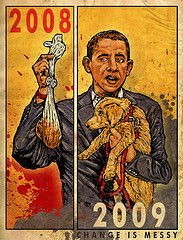From Power Line:
In this interview in the Jerusalem Post, Elliot Abrams offers his insights on, among oher topics, relations between the Bush administration and Israel. Abrams, of course, held important foreign policy and national security positions during both terms of the Bush presidency. The interview was conducted by Ruthie Blum Leibowitz who is married to Abrams' sister. (Leibowitz and her sister are the daughters of Norman Podhortez and Midge Decter).
Here are a few of the insights Abrams provided during the interview:
On how Benjamin Netanyahu and President Obama would get along:
As for Netanyahu and Obama, I think they'll get along just fine on a personal level, if Bibi indeed becomes prime minister. Both are smooth, both charmers. As for the rest of it, well, that will depend on Obama's appointments, on Bibi's coalition and on many external factors that could come along and shape the way policy is determined in both countries - such as a repeat of 9/11, for example.
On the role of the State Department under President Bush:
In Bush's first term, the White House's relationship with the State Department changed after 9/11. During the election campaign of 2000, it was generally thought that then-governor Bush didn't know much about foreign policy or national security affairs, and that Colin Powell would lead on that front, while the president's main concern would be domestic. Whether that was true or not - or whether it would have been true under normal circumstances - is irrelevant, because 9/11 happened. And he became a wartime president. But I don't think secretary Powell made that shift in his own mind. In any event, the president took over. He then moved all the really important national security decision-making to the White House. Take Powell's trips to the Middle East and Israel. The view of the press people accompanying him, and of some State Department officials, was that each trip was less significant than the previous one, and that the State Department was becoming visibly less significant in making policy.
Now, this all changed when Condi - Bush's closest adviser - became secretary of state. The role of the State Department then became much more important, though it depended on the issue. For example, when it came to Iraq, the State Department was far less important, because Iraq policy was really being made by the president, the vice president, the secretary of defense and the joint chiefs. But there were other areas of policy in which the State Department was very directly and deeply involved. Palestinian-Israeli affairs was one of them. The other was North Korea. In both cases, policy was essentially made in the State Department.
On why optimism among some in the Bush administration about the prospects for a deal between the Israelis and the Palestinians was misguided:
[O]thers said that the solution here, the eventual deal, was pretty well understood on both sides - that there weren't a million possibilities for where the border between Israel and the Palestinian state would be. The same with regard to Jerusalem. Therefore, they said, it won't take all that much negotiating to get there. That was the conventional wisdom. But it seemed to me that the opposite view was right: that if everybody knows what a deal has to look like, and year after year and decade after decade, it is not possible to reach it, isn't it obvious that it's because neither side wants that deal? Now, the reasons for not wanting it can vary, and they can also change over time, but it does seem to me that if everybody knows what the options are, and the most Israel can offer is less than the least the Palestinians can accept, the solution is not close at hand.
This assessment is no less sagacious just because Barack Obama is president.
On the prospects for preventing Iran from developing nuclear weapons without taking military action against it:
In the last year of the Bush administration, the attitudes of [British Prime Minister Gordon] Brown, [German Chancellor Angela] Merkel and [French President Nicolas] Sarkozy were pretty tough on the issue of sanctions against Iran. And I think that the US - with all the goodwill President Obama has - could organize more effective sanctions. For this reason, I regret that Secretary Clinton isn't meeting with the British, German and French foreign ministers to discuss getting that done now. I also wish that, in addition to a Middle East envoy, there would be someone in charge of sanctions against Iran. There is still some possibility that if it is made painful enough for the Iranians, they might succumb to a deal that stops them short of building a nuclear weapon.
***
That's some pretty deep stuff from an insider. As we've argued all along, Bush got it right. Maybe some mistakes were made in the details, but he did his best to keep us safe.
Time will tell if Obama will do the same, but so far, his track record, his rhetoric, and his apparent naivite are frightening.






No comments:
Post a Comment